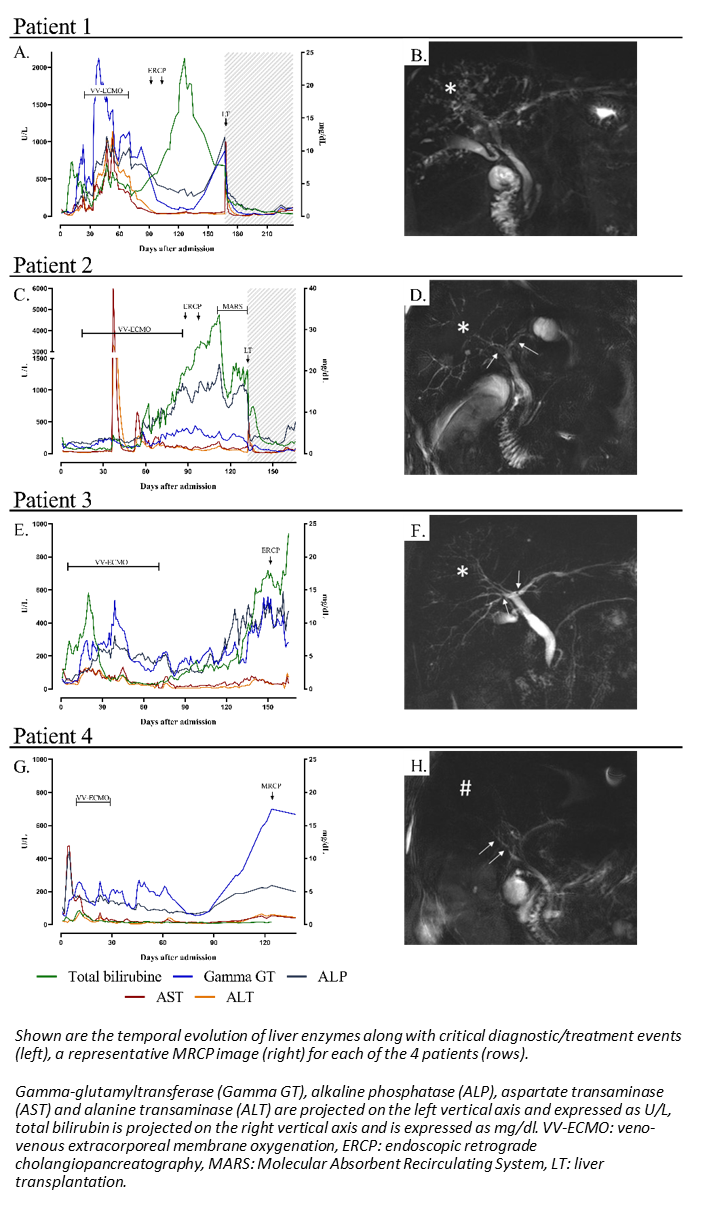Liver Transplantation for COVID-19-associated Cholangiopathy
1Abdominal Transplantation Surgery, University Hospitals Leuven, Leuven, Belgium, 2Medical Intensive Care Unit, University Hospitals Leuven, Leuven, Belgium
Meeting: 2021 American Transplant Congress
Abstract number: LB 24
Keywords: COVID-19, Liver transplantation, Risk factors
Topic: Clinical Science » Liver » Liver: Recipient Selection
Session Information
Session Name: Late Breaking: All Organs
Session Type: Rapid Fire Oral Abstract
Date: Tuesday, June 8, 2021
Session Time: 6:00pm-7:00pm
 Presentation Time: 6:35pm-6:40pm
Presentation Time: 6:35pm-6:40pm
Location: Virtual
*Purpose: The hallmark viral pneumonia of coronavirus-19-disease (COVID-19) is often accompanied by important extra-pulmonary manifestations. Liver dysfunction occurs in up to 45% of COVID-19 patients, predominantly as moderate transaminitis whereas a cholestatic pattern is rare. Additionally, it is often described as inconsequential with negligible clinical impact. We describe the cases of 4 patients with COVID-19 who developed cholestatic liver injury that progressed towards a destructive cholangiopathy requiring liver transplantation in 2 patients.
*Methods: Cases of all patients with COVID-19 admitted to our intensive care unit (ICU) between March and June 2020 were retrospectively reviewed for proven cholestatic injury. Additionally, patients referred to our liver transplant unit with a history of COVID-19 were also considered.
*Results: Three out of 114 COVID-19 patients admitted to our ICU and one externally referred patient were considered for this case series. All patients suffered severe COVID-19 with need for mechanical ventilation, proning and extracorporeal membrane oxygenation. These patients all developed moderate to severe cholestatic liver injury after resolution of acute respiratory distress syndrome (Figure 1). The clinical presentation, cholangiogram, and histological findings were all typical of the critical care-associated condition ‘secondary sclerosing cholangitis in critically ill patients’ (SSC-CIP). Two patients ultimately required liver transplantation for refractory cholangitis.
*Conclusions: The high incidence of this otherwise rare disease suggests that patients surviving severe COVID-19 are at increased risk of developing SSC-CIP. Several disease- and/or treatment-specific features may predispose to biliary ischemia and damage, while a direct pathogenic role of severe acute respiratory syndrome coronavirus 2 (SARS-CoV-2) via cholangiocyte angiotensin-converting-enzyme-2 (ACE2) receptors is under investigation. We aim to raise awareness about the potential higher risk for SSC-CIP in patients recovering from severe COVID-19, and encourage early diagnosis and timely consideration of liver transplantation as the sole therapeutic option.
To cite this abstract in AMA style:
Blondeel J, Meersseman P, Gilbo N, Jochmans I, Sainz-Barriga M, Pirenne J, Monbaliu D. Liver Transplantation for COVID-19-associated Cholangiopathy [abstract]. Am J Transplant. 2021; 21 (suppl 3). https://atcmeetingabstracts.com/abstract/liver-transplantation-for-covid-19-associated-cholangiopathy/. Accessed February 18, 2026.« Back to 2021 American Transplant Congress

